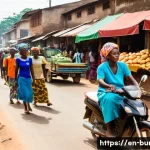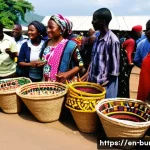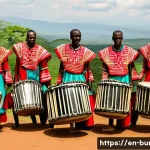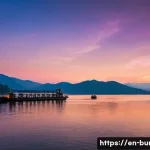Burundi, often overlooked, is a hidden gem in East Africa, bursting with natural beauty and rich cultural experiences. From the shores of Lake Tanganyika to the rolling hills and vibrant markets, this country offers a unique adventure for the intrepid traveler.
I’ve always been drawn to off-the-beaten-path destinations, and Burundi definitely delivered. Having spent some time navigating its bustling capital, Bujumbura, and trekking through the stunning landscapes, I’ve gathered a few essential tips to help you make the most of your journey.
Picture yourself sipping locally grown coffee while overlooking breathtaking vistas – a truly unforgettable experience. It’s a different kind of travel, one that really stays with you.
Let’s get down to the nitty-gritty, and I’ll share what I wish I knew before I went. Let’s dive into the details below!
Embrace the Rhythm of Burundi: Mastering the Local Culture
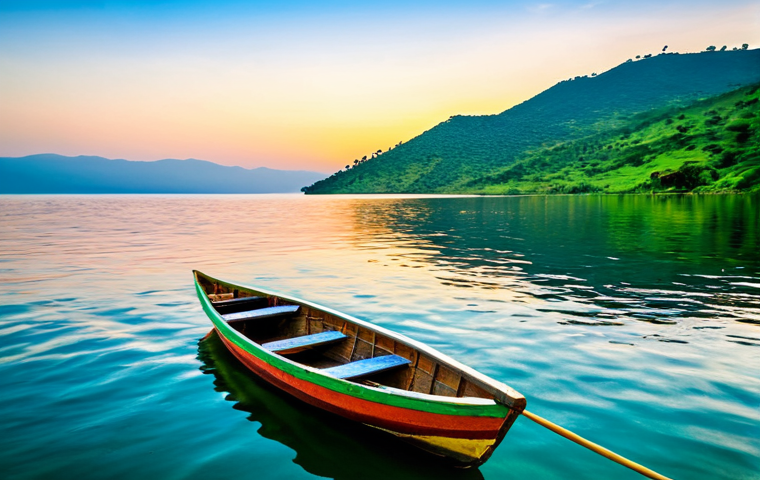
1. Navigate with “Amakuru?” and a Genuine Smile
Before you even unpack your bags, learn this one phrase: “Amakuru?” It means “How are you?” in Kirundi, the national language. Don’t just rattle it off; say it with a smile and genuine curiosity. I can’t tell you how many doors this simple greeting opened for me. One time, I was hopelessly lost trying to find a local coffee plantation. After asking “Amakuru?” to an elderly woman tending her garden, she not only pointed me in the right direction but also invited me in for a cup of her freshly brewed coffee. That impromptu invitation turned into an afternoon of laughter and stories, a far more enriching experience than any guidebook could offer. Also, remember that Burundi is a very traditional society, so dressing modestly, especially when visiting rural areas or religious sites, goes a long way in showing respect. Trust me, a little effort to understand and embrace the local customs will transform your trip from a mere visit into a truly immersive cultural exchange. It’s about showing respect, making connections, and opening yourself up to unexpected moments of joy and discovery.
2. Master the Art of Bartering (Respectfully!)
Markets in Burundi are a sensory explosion – vibrant colors, exotic smells, and the lively chatter of vendors hawking their wares. While prices are generally reasonable, don’t be afraid to engage in a bit of friendly bartering. But remember, it’s not about squeezing every last penny; it’s about the interaction. I recall haggling for a beautiful hand-woven basket at the Bujumbura Central Market. Instead of focusing solely on the price, I complimented the vendor on her craftsmanship and shared a few jokes. We ended up settling on a price that was fair to both of us, and I walked away with a unique souvenir and a genuine connection. A good starting point is to offer about 70-80% of the asking price, but always do so with a smile and a respectful tone. Keep the exchange lighthearted and be prepared to walk away if you can’t reach an agreement. Often, the vendor will call you back with a counteroffer. Above all, remember that these markets are a source of livelihood for the local community, so be fair, be friendly, and enjoy the experience. It is not always about getting the cheapest price but about getting value and building a relationship with the vendor.
Unveiling Burundi’s Natural Wonders: Adventure Awaits
1. Hike the “Source of the Nile”: A Bragging Right Worth Earning
Okay, so technically, there’s some debate about the *exact* source of the Nile. But Burundi lays claim to one of the contenders, and that’s good enough for me. The hike to the source is not for the faint of heart. I remember the humidity being so thick you could practically taste it, and the trail was more like a muddy obstacle course than a leisurely stroll. But trust me, the sense of accomplishment when you finally reach the marker is unparalleled. Standing there, knowing you’re at the origin of one of the world’s most legendary rivers, is a truly surreal experience. Plus, the views along the way are simply stunning. You’ll trek through lush forests teeming with birdsong, pass by cascading waterfalls, and encounter friendly villagers who will greet you with warm smiles. The journey is as rewarding as the destination itself. Hire a local guide; not only will they keep you from getting lost, but they’ll also share fascinating insights about the local flora, fauna, and history. Don’t forget to bring plenty of water, sunscreen, and insect repellent. You are going to need it!
2. Lake Tanganyika: Your Oasis of Tranquility (and Hippos!)
After all that hiking, you’ll deserve some serious relaxation. Head to Lake Tanganyika, one of the deepest and oldest lakes in the world. The shores of the lake offer a variety of activities, from swimming and sunbathing to kayaking and fishing. But my personal favorite was simply lounging on the beach with a good book, listening to the gentle lapping of the waves and soaking up the African sun. You may think, “Oh, a lake is just a lake”. Think again! The biodiversity of Lake Tanganyika is astounding. It is home to hundreds of species of fish, many of which are found nowhere else on Earth. Take a boat trip to explore the lake’s hidden coves and islands, and keep an eye out for hippos and crocodiles! I’ll never forget the time I was kayaking and suddenly spotted a hippo emerge from the water just a few meters away. Talk about an adrenaline rush! For a truly unique experience, consider staying at one of the lakeside lodges. You’ll fall asleep to the sounds of the African night and wake up to breathtaking views of the sunrise over the lake. Remember that swimming in the lake is generally safe, but always be aware of your surroundings and heed the advice of local guides. And don’t forget your camera – the sunsets over Lake Tanganyika are simply magical.
Navigating Burundi: Practical Tips for a Smooth Journey
1. Visa and Logistics: Plan Ahead, Breathe Easy
Don’t let the nitty-gritty details of travel planning stress you out. Getting a visa for Burundi can be a bit tricky, so start the process well in advance. The easiest option is often to apply for an East Africa Tourist Visa, which allows you to visit Burundi, Kenya, and Rwanda with a single visa. This can save you time and money, especially if you’re planning on exploring the region. You can apply for the visa online through the immigration websites of Kenya or Rwanda, or through the Burundian Embassy in your country. I always recommend printing out multiple copies of your visa and passport and keeping them in separate locations. Trust me, you’ll thank me later if your original documents get lost or stolen. Also, be sure to check the latest travel advisories from your government before you go. Burundi is generally a safe country to visit, but it’s always good to be aware of any potential risks or security concerns. With a little preparation, you can ensure a smooth and stress-free entry into this beautiful country.
2. Getting Around: Embrace the Local Vibe (and Be Patient)
Forget Uber. Getting around Burundi is an adventure in itself. The most common form of transport is the “foul-foul,” a shared taxi that zips around the cities and towns. These are incredibly cheap and efficient, but they can also be a bit chaotic. Don’t expect a private ride; you’ll likely be sharing the taxi with several other passengers, and the driver may stop frequently to pick up or drop off people along the way. It’s all part of the experience! If you prefer a more private option, you can hire a taxi, but be sure to negotiate the price beforehand. For longer distances, consider taking a bus. Buses are generally comfortable and reliable, but they can be crowded, especially during peak season. And be prepared for some delays – schedules are more like guidelines than hard-and-fast rules. The roads in Burundi can be rough, especially in rural areas, so be sure to buckle up and be prepared for a bumpy ride. If you’re planning on renting a car, I highly recommend hiring a driver. Not only will they be familiar with the local roads, but they’ll also be able to navigate the traffic and negotiate with the police (if necessary). Traveling in Burundi requires patience, flexibility, and a sense of humor. Embrace the local vibe, be prepared for the unexpected, and you’ll be rewarded with a truly authentic travel experience.
Savoring Burundi: A Culinary Adventure
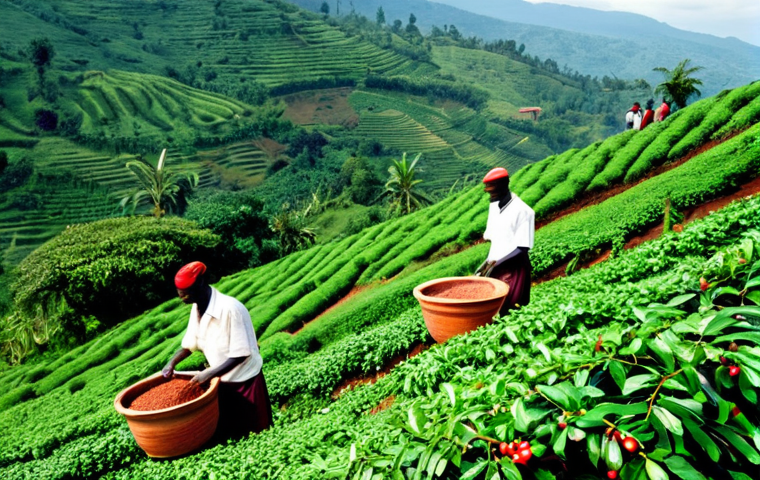
1. Brochettes and Beyond: A Carnivore’s Paradise
If you’re a meat lover, Burundi will be heaven for you. Brochettes, grilled meat skewers, are a staple of Burundian cuisine. You’ll find them everywhere, from roadside stalls to upscale restaurants. The meat is typically marinated in a blend of spices and herbs, giving it a unique and flavorful taste. I tried everything from goat and beef to chicken and fish, and all were delicious. But don’t limit yourself to just brochettes. Try the “ibiharage,” a hearty bean stew that’s often served with rice or potatoes. It’s a filling and flavorful dish that’s perfect for a cold evening. For a truly authentic experience, head to a local market and sample some of the street food. You’ll find a variety of snacks and treats, from fried plantains to grilled corn on the cob. Don’t be afraid to try something new – you might just discover your new favorite dish. The local beer, Primus, is a refreshing and affordable option. Just be sure to drink responsibly and be aware of your surroundings. Burundian cuisine is hearty, flavorful, and satisfying. It’s a reflection of the country’s rich culture and history, and it’s an experience that you won’t soon forget.
2. Coffee Culture: From Bean to Cup, a Sensory Delight
Burundi is renowned for its high-quality coffee, and no trip to the country is complete without indulging in the local coffee culture. The coffee beans are grown in the highlands, where the climate and soil conditions are ideal for producing a rich and flavorful brew. You can visit a local coffee plantation and learn about the entire coffee-making process, from planting and harvesting to roasting and brewing. Many plantations offer tours and tastings, allowing you to sample different varieties of coffee and learn about the unique characteristics of each. For a truly authentic experience, try the “ikombe,” a traditional Burundian coffee ceremony. The coffee is brewed in a clay pot over a charcoal fire, and it’s served in small cups. The ceremony is a social event, and it’s a great way to connect with the local community. Coffee is more than just a beverage in Burundi; it’s a symbol of hospitality, friendship, and community. Whether you’re a coffee connoisseur or simply looking for a unique cultural experience, Burundi’s coffee culture is sure to delight your senses.
Staying Safe and Healthy: Prioritize Your Well-being
1. Health Precautions: Vaccinations and Common Sense
Before you even start packing your bags, prioritize your health. Consult your doctor about necessary vaccinations and malaria precautions. Yellow fever vaccination is typically required for entry, and malaria is a risk in many parts of the country. Your doctor can advise you on the best course of action based on your individual health history and travel plans. Pack a comprehensive first-aid kit with essentials like bandages, antiseptic wipes, pain relievers, and diarrhea medication. It’s always better to be prepared for minor ailments, especially when you’re traveling in a developing country. Drink bottled water only, and avoid ice in your drinks. Street food can be delicious, but be sure to choose vendors with good hygiene practices. Wash your hands frequently, especially before meals. Common sense goes a long way in staying healthy while traveling. With a little preparation and caution, you can minimize your risk of illness and enjoy a healthy and worry-free trip to Burundi.
2. Safety Tips: Be Aware, Be Respectful, Be Smart
Burundi is generally a safe country to visit, but it’s always important to be aware of your surroundings and take precautions to protect yourself from crime. Avoid walking alone at night, especially in poorly lit areas. Keep your valuables out of sight, and be wary of pickpockets and scams. Dress modestly and respectfully, especially when visiting rural areas or religious sites. Avoid political discussions, as these can be sensitive in Burundi. Always be respectful of local customs and traditions. Learn a few basic phrases in Kirundi, the local language. This will show your respect for the local culture and make it easier to communicate with people. Be cautious when taking photographs. Ask permission before photographing people, especially in rural areas. It’s important to be respectful of their privacy and avoid taking photos that could be considered offensive. Trust your instincts. If something feels wrong, don’t hesitate to remove yourself from the situation. With a little awareness and common sense, you can have a safe and enjoyable trip to Burundi.
| Tip Category | Specific Tip | Why It Matters |
|---|---|---|
| Culture | Learn “Amakuru?” (How are you?) | Opens doors and shows respect. |
| Bargaining | Barter respectfully at markets | Builds relationships and ensures fair prices. |
| Nile Source | Hire a local guide for the hike | Enhances safety and provides local insights. |
| Lake Tanganyika | Be aware of hippos when kayaking | Ensures personal safety. |
| Visa | Apply for East Africa Tourist Visa | Saves time and money for regional travel. |
| Transport | Negotiate taxi fares beforehand | Avoids price gouging. |
| Food | Try local brochettes | Experiences authentic cuisine. |
| Coffee | Visit a coffee plantation | Learns about coffee culture and processes. |
| Health | Drink bottled water | Prevents waterborne illnesses. |
| Safety | Avoid walking alone at night | Reduces risk of crime. |
Wrapping Up
Burundi, with its rolling hills and welcoming people, offers a travel experience unlike any other. It’s a place where you can truly connect with nature and immerse yourself in a vibrant culture. While it may not be the easiest destination to navigate, the rewards are well worth the effort. So, pack your bags, embrace the unexpected, and get ready for an adventure of a lifetime. You might just find that Burundi captures your heart and leaves you with memories that will last a lifetime.
Handy Tips to Know
1. Currency: The Burundian Franc (BIF) is the local currency. Credit cards are not widely accepted, so bring cash. ATMs can be found in Bujumbura, but it’s best to have enough cash on hand, especially if you’re traveling to rural areas.
2. Power Plugs: Burundi uses the European-style plug (Type C and E). Bring a universal adapter to charge your devices.
3. Language: Kirundi is the national language, but French is also widely spoken. Learning a few basic phrases in Kirundi will go a long way in making connections with the locals.
4. Best Time to Visit: The dry season (June to September) is generally considered the best time to visit Burundi, as the weather is more pleasant for hiking and outdoor activities.
5. Haggling Etiquette: When bartering at markets, always be respectful and friendly. Remember that these markets are a source of livelihood for the local community, so be fair in your negotiations.
Key Takeaways
Experiencing local culture with greetings like “Amakuru?” can significantly enrich your interactions and show respect.
Hiking to the source of the Nile is an unforgettable adventure, but consider hiring a local guide for safety and insights.
Lake Tanganyika offers relaxation and unique wildlife sightings, but be mindful of hippos and crocodiles.
Planning your visa and transportation in advance can minimize stress and enhance your travel experience.
Savoring local cuisine, like brochettes and Burundian coffee, provides a delicious taste of the country’s culture.
Frequently Asked Questions (FAQ) 📖
Q: What’s the best time of year to visit Burundi, considering the weather?
A: Honestly, after sweating it out during a particularly humid spell, I’d recommend shooting for the dry season, which runs from June to September. The cooler temperatures and less rain make trekking and exploring much more enjoyable.
Plus, the clearer skies are perfect for those stunning photo ops I keep raving about. Trying to navigate those hills in a downpour? Trust me, not fun!
Q: Is it safe to travel in Burundi, and what precautions should I take?
A: Okay, so this is a big one. Like any place that’s seen its share of challenges, it pays to be smart. I felt relatively safe sticking to touristy areas in Bujumbura during the day, but I definitely wouldn’t wander off alone at night.
The U.S. State Department has some good travel advisories, so definitely check those out before you go. Hiring a local guide who knows the area is a lifesaver, and keeps you out of potentially sticky situations.
Basic rule of thumb? Just be aware of your surroundings and don’t flash valuables.
Q: What’s the local currency, and is it easy to exchange money or use credit cards?
A: The local currency is the Burundian Franc (BIF). And here’s a tip I learned the hard way: credit cards aren’t widely accepted, especially outside of major hotels in Bujumbura.
I’d suggest bringing U.S. dollars or Euros to exchange for BIF upon arrival. You can usually find exchange services at the airport or in the city center.
Just a heads up, though, keep an eye on those exchange rates – they can fluctuate. And always, ALWAYS keep some smaller bills handy for local markets and smaller vendors.
Makes life a whole lot easier!
📚 References
Wikipedia Encyclopedia
구글 검색 결과
구글 검색 결과
구글 검색 결과
구글 검색 결과
구글 검색 결과

